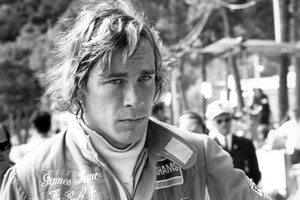Columns -
Another World

BY MAURICE HAMILTON
British television last week ran a documentary on James Hunt and Barry Sheene. It happened to coincide with a desperately contrived attempt by Tiger Woods to reinvent his brand one year on from the scandal over working on his stroke play away from the golf course.</p> <p>This juxtaposition of sporting lives brought home just how much has changed since Hunt and Sheene won their respective world motor racing and motorcycling titles during the glorious summer of 1976. If the British heroes tried to conduct their cavalier lifestyles now as they did then, Woods would not be alone in fighting a desperate rear-guard action demanded by commercial imperatives. Or would he?</p> <p>The difference between the golfer and his motor sport counterparts is that Hunt and Sheene didn't give a toss. Or, to be more precise, they were allowed not to. The thing that hits you instantly when watching clips from three decades ago is the absence of public relations people ring-fencing their golden geese and stage-managing every move, every utterance. </p> <div class="wsw-Photo" style="width: 300px"><a href="http://www.grandprix.com/jpeg/phc/1996japan-hill1-lg.jpg"><img height="200" width="300" src="http://www.grandprix.com/jpeg/phc/1996japan-hill1-rg.jpg" alt="Damon Hill, Japanese GP 1996" /></a><p class="photocaption">Damon Hill, Japanese GP 1996 </p><p class="photocredit"> © The Cahier Archive</p></div> <p>The most frustrating aspect of operating in today's clinical environment is the constant presence of minders when you attempt to speak to drivers. Not a word is spoken without a uniformed arm coming between you and placing a micro-recorder on the table. </p> <p>Yes, the media is much more invasive - sometimes outrageously so - and there are occasional journalist visitors whose intentions may be less than honourable. But for those of us who are known quantities - and, unlike the media tourist, returning to face the music should criticism have been offered in print - it is mildly insulting to have a flunky recording every word and adding insult to injury by looking bored stiff while doing so. </p> <p>It's as if neither side can be trusted; the driver to utter the required anodyne comment and the journalist to write down those words exactly as they emerged in a polished monotone. The mutual respect that previously produced off-the-record comments has been eroded.</p> <div class="wsw-Photo" style="width: 300px"><a href="http://www.grandprix.com/jpeg/phc/1956monza-collins-hawthorn1-lg.jpg"><img height="200" width="300" src="http://www.grandprix.com/jpeg/phc/1956monza-collins-hawthorn1-rg.jpg" alt="Mike Hawthorn, Peter Collins, Italian GP 1956" /></a><p class="photocaption">Mike Hawthorn, Peter Collins, Italian GP 1956 </p><p class="photocredit"> © The Cahier Archive</p></div> <p>As Sir Stirling Moss says of drivers on the documentary: "When the race is over, instead of chasing girls, as they did in my day, now they say thanks to Vodafone." NASCAR has got to be the worst as the driver kicks off any interview by laboriously checking out the list of names handily embroidered as an aide memoire on the sleeves and chest of his overalls. </p> <p>A PR person, had they been programmed in 1976 as they are now, would have had a blue fit when Hunt, in response to a question about how he was going to run his race, replied succinctly to camera: "Just jump in and give it arseholes". </p> <p>Today, that would require grovelling apologies from the TV station and a sycophantic defence from the Communications Director on Hunt's team, not to mention being hauled in front of the FIA for bringing the sport into disrepute. And I wouldn't be surprised if the Australian traffic police issued a summons for teaching youngsters bad habits. </p> <p>The change in media relationships is covered in the documentary. For this, they include several clips from an interview with Max Mosley.</p> <div class="wsw-Photo" style="width: 300px"><a href="http://www.grandprix.com/jpeg/phc/1979-silverstone-sheene-roberts1-lg.jpg"><img height="200" width="300" src="http://www.grandprix.com/jpeg/phc/1979-silverstone-sheene-roberts1-rg.jpg" alt="Barry Sheene Kenny Roberts, Silverstone 1979" /></a><p class="photocaption">Barry Sheene Kenny Roberts, Silverstone 1979 </p><p class="photocredit"> © The Cahier Archive</p></div> <p>Whatever you may think about the former FIA President's peccadilloes, you have to respect his refusal to be cowed by the power of the British tabloid press. Mosley has been emboldened to such an extent that he has petitioned the European Court of Human Rights to introduce a law forcing newspapers to inform subjects before publishing stories about their private lives. </p> <p>The merits and otherwise of this could be the subject of an entire column on its own. The point is that were today's standards of reportage the norm in 1976, Hunt (an occasional user of drugs, according to Mosley) would have been featuring regularly on the front pages of newspapers rather than the back.</p> <p>These were different times in every respect, the gung-ho attitudes perhaps excusable as a reaction to death being a constant spectre looming over every race and test session. Mosley, eloquent and stiff-upper lip, brought an unexpectedly moving moment as he discussed a desperate risk factor that some observers of a certain age feel ought to remain part of the sport today.</p> <p>"People like that talk about living on the edge and all the romance and so on," said Mosley. "But when someone is actually dead and you have to go to the funeral - and it usually would be a beautiful summer afternoon....it's..." And then he ran out of words; simply could not continue for a few moments. </p> <div class="wsw-Photo" style="width: 300px"><a href="http://www.grandprix.com/jpeg/phc/2009monaco-mosley1-lg.jpg"><img height="200" width="300" src="http://www.grandprix.com/jpeg/phc/2009monaco-mosley1-rg.jpg" alt="Max Mosley, Monaco GP 2009" /></a><p class="photocaption">Max Mosley, Monaco GP 2009 </p><p class="photocredit"> © The Cahier Archive</p></div> <p>Gathering himself together with quiet dignity, Mosley continued:</p> <p>"You can think of person after person after person..... You could have a wonderful party with all the people that got killed."</p> <p>Hunt and Sheene survived the race track only for James to die suddenly of a heart attack in 1993 at the age of 45. Ten years later, Barry succumbed to throat cancer. On the evidence of the film, they would be leading the way at Max's party. But the media would have to stand outside. In another world.</p> <p><script src="http://connect.facebook.net/en_US/all.js#xfbml=1"></script><fb:like href="http://www.grandprix.com/columns/maurice-hamilton/another-world.html" layout="box_count"></fb:like>